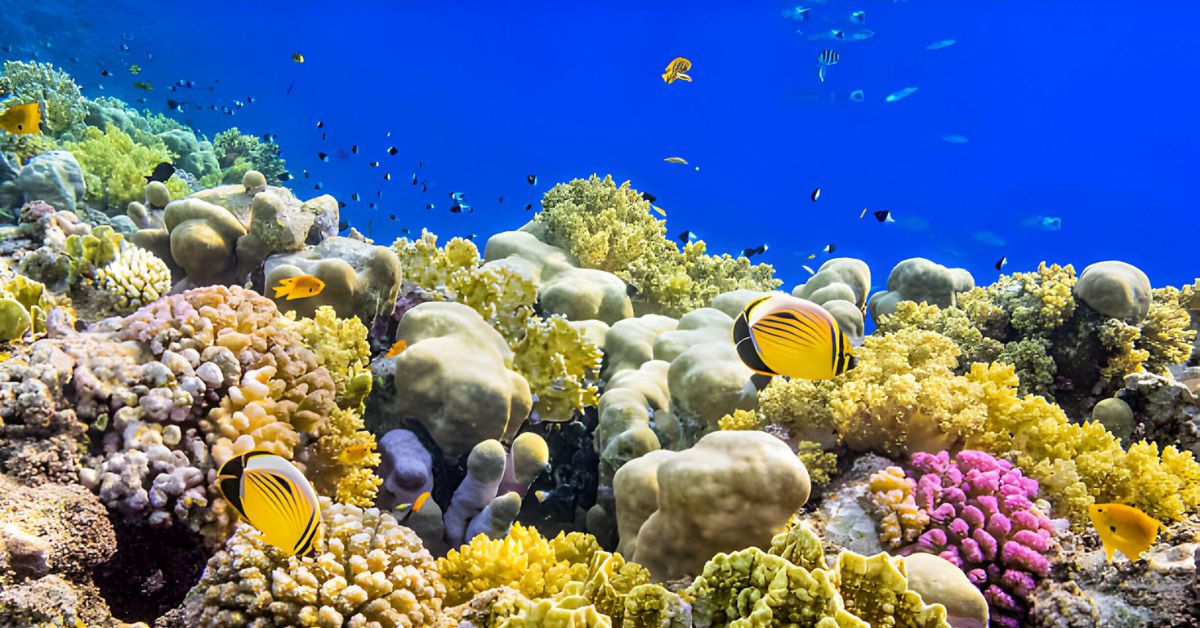Decades of research have unequivocally linked climate change to the excessive use of fossil fuels and industrial emissions. The consequence is a notable rise in greenhouse – the most important of which is carbon dioxide. As its levels and those of other culprits rose, so did the planet’s temperature, and as a result, a silent extinction of marine wildlife looms over the distance.
Preserving marine life is a pressing concern that impacts marine ecosystems and human society globally. With oceans spanning over 70 percent of the Earth’s surface, they host a vast diversity of species, ranging from microscopic plankton to colossal whales. Marine life serves as a crucial regulator of the planet’s climate, offering sustenance and livelihoods for millions worldwide while also underpinning various industries.
Egypt is rich in marine wildlife, with 1000 species of fish, 800 species of marine molluscs, 1000 species of crustaceans, and more than 325 species of coral reefs.
“The rise in seawater temperature represents a critical challenge. Coral reefs, Earth’s most diverse ecosystems are particularly vulnerable.” Mahmoud Hanafy, a professor of marine biology at the Suez Canal University, tells Egyptian Streets.
According to Hanafy, coral reefs sustain high biodiversity and provide significant economic benefits, supporting tourism, fishing, and pharmaceutical industries. Moreover, they play a crucial role in coastal protection, mitigating erosion, and reducing the impact of waves and even tsunamis.
“The primary impact of rising temperatures on coral reefs manifests as coral bleaching, especially during peak summer temperatures. Coral, symbiotically linked with algae, becomes stressed and expels the algae, resulting in coral bleaching. Corals struggle to survive without the algae, leading to widespread mortality,” he says.
Scientists warn of the potential extinction of coral reefs worldwide by the century’s end. The Great Barrier Reef in Australia, for instance, faces coral bleaching events threatening 35 to 50 percent of its coral reef area, endangering marine biodiversity and the economic livelihoods of millions of people.
Without a combination of sustained long-term reductions in emissions and immediate innovative actions, there is a bleak future ahead where coral reefs, as we currently recognize them, will vanish, according to Anne Cohen, a coral expert affiliated with the Woods Hole Oceanographic Institution in Massachusetts.
“The inability of industrial nations to compromise on their prosperity by reducing carbon emissions is now threatening life on Earth and could potentially lead to a massive extinction, similar to the fifth extinction event on the planet,” Hanafy states.
But, as the world’s corals are becoming more vulnerable, the ones in Egypt’s Red Sea are thriving,
“The situation in the Red Sea is incredibly interesting. A plethora of scientific articles show that Egyptian coral reefs are not likely to suffer complete loss within this century, as contrary to other coral populations around the world, offering hope for their survival and potential re-establishment elsewhere,” he explains.
Since 2012, Egypt has faced unprecedented temperature spikes, causing coral bleaching events. However, studies show certain coral species in the southern Red Sea, particularly near Marsa Alam, demonstrated remarkable resilience, with some species recovering up to 73 percent within a month of bleaching events. Up north, coral bleaching occurred only in four species, but the remaining majority was able to resist bleaching.
These findings have prompted the government to take action. According to Hanafy, significant governmental efforts are underway to protect these vital ecosystems, with plans to declare the Egyptian Red Sea coral reefs a marine protected area.
“The office of the prime minister has given preliminary approval of the effort, and coordination between various entities is currently underway to finalize the declaration,” Hanafy states. “I’ve named these reefs the ‘Great Egyptian Coral Reef,’ emphasizing their unique and critical status. Unlike coral reefs elsewhere, which face grim prospects, the Egyptian reefs are poised for survival.”
Climate change is impacting biodiversity globally, with species migrating towards cooler regions. However, the Red Sea’s unique conditions have thus far shielded its primary ecosystems from significant impacts. Mangroves, seagrasses, and coral reefs in the Red Sea remain resilient, a testament to their ability to adapt and thrive.
“We’re facing challenges like excessive diving in certain areas, but we’re striving to find solutions based on the principles of sustainable resource use. Given its significant economic, scientific, human, and ethical value, preserving the Red Sea’s biodiversity is imperative for future generations and the world as a whole,” Hanafy says.





Comments (2)
[…] Amid Climate Change Challenges, Egypt’s Corals Demonstrate Surprising Resilience, Biologist Says […]
[…] Amid Climate Change Challenges, Egypt’s Corals Demonstrate Surprising Resilience, Biologist Says […]